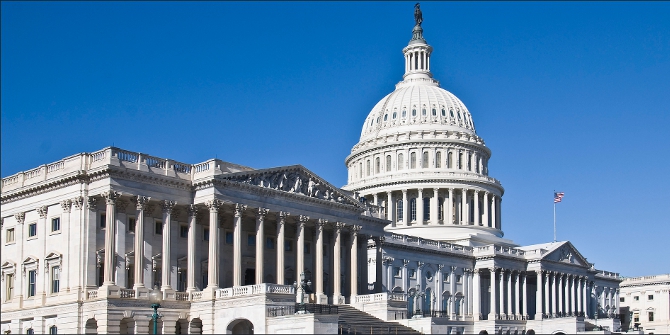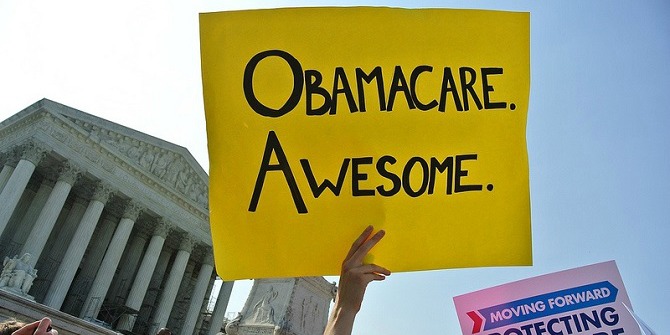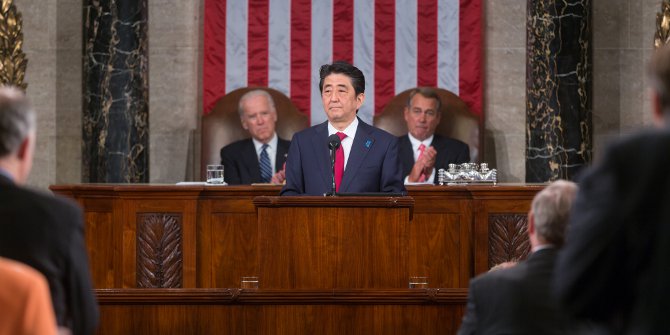USApp Managing Editor, Chris Gilson looks at the best in political blogging from around the Beltway. Our round-up of state blogs will follow on Saturday afternoon.
President Obama, the Democratic Party, and the GOP
On Thursday this week, PoliticusUSA reports that according to a new poll, for the first time since 2009 more Americans approve of President Obama’s handling of the economy than disapprove. They say that the results show that there is a growing optimism over the country’s economic future and that they feel that Obama is steering the country forward. Also this week, the White House and Congress came to a compromise on how the latter body would review the recent deal with Iran, writes Outside the Beltway. They say that while Congress will be able to have a voice on the agreement, Republicans will not be able to scupper the deal, as it allows them to make a resolution of approval or disapproval after a 30-day consideration period, which the President could then veto.
Moving on to the Republican Party, Roll Call’s Hawkings Here looks at why the Republican Party has remained mostly silent on the recent indictment of Democratic Senator Bob Menendez (NJ) on federal bribery charges. They say that Menendez has actually been very helpful to Congressional Republicans in trying to rein in aspects of President Obama’s foreign policy, and that they are also very conscious that the same thing could happen to them. Wonkblog meanwhile says that the legendary supply-side economist Arthur Laffer is convinced that the Republican Party is certain to begin a winning streak in 2016, if they adopt a tax plan which would lower rates and eliminate deductions, and would take advantage of the U.S economy’s potential for growth. On Tuesday, Talking Points Memo reports that New Jersey Governor Chris Christie has announced a proposal that would see major cuts to Social Security. They say that Christie’s approach diverges from traditional GOP plans in that it is essentially aggressive means testing rather than a form of privatization. Ahead of the Supreme Court hearing oral arguments in gay marriage cases, Townhall writes this week on the growing support for same-sex marriage amongst conservatives. They comment that in order to win the support of Millennials – a generation that is 80 million strong – the Republican Party needs to open its hearts and minds to same-sex marriage.
Elections and the road to 2016
This week also saw GOP Florida Senator Marco Rubio announce his candidacy for president (more of which in a minute), which has created a ‘scrum’ for his open-seat in 2016, writes Roll Call’s At the Races. They say that keeping the open seat will be an expensive challenge for the Republican Party, as Democratic Representative, Patrick Murphy, may be hard to beat if he gains his party’s nomination. National Journal, meanwhile says that despite the fact that are more than 560 days until the election, endangered House GOP candidates are already fundraising as if the vote was just around the corner, with some having raised more than $700,000 in the first quarter of the year.

The biggest news about the 2016 race this week was of course Hillary Clinton’s announcement Sunday that she is running for president, surprising no-one. The Atlantic looks at whether or not Clinton’s nomination is inevitable, and comment that there is a danger that voters may take a second look at her challengers if they believe that it is the case. Meanwhile, FiveThirtyEight writes that as Clinton begins her campaign, it is a tossup as to whether she wins the election (if she wins the nomination), owing to the fact that she is not an incumbent, but is also a centrist with the potential to raise a great deal of money. Many commentators have referred to Clinton as a ‘polarizing figure’; The American Prospect takes issue with this, writing that she is no more or less polarizing than any other major political figure, and that whichever Republican gains the nomination will be an equally polarizing figure by the time of the election.
National Journal writes this week that Clinton is learning ‘all the wrong lessons’ from President Obama in emulating his 2008 presidential campaign. They say that while Obama’s campaign was more akin to an innovative start-up, hers is an ‘entrenched corporate behemoth’ that needs to come up with new tactic. The Federalist is similarly downbeat about Clinton’s coming campaign, giving eight reasons why they think it will be a ‘trainwreck’, including that she has no accomplishments, is an ‘epic liar’, and that she has not won a single tough election. You may recall that in February there was a good deal of controversy over the revelation that Clinton had used a private email server for government correspondence whilst she was Secretary of State. Hit & Run reports that Congress asked Clinton about her use of email as far back as 2012, but that Clinton never responded.
Two years ago New Jersey Governor Chris Christie was considered by many to be the frontrunner for the Republican Party’s 2016 presidential nomination, but following the ‘Bridgegate’ scandal, Christie’s star has most definitely fallen. Outside the Beltway comments this week that Christie still seems to think that he can run for president, but that what would have already been an uphill battle will now be much more difficult given the rest of the GOP field. Meanwhile, PoliticusUSA looks at another GOP candidate, Senator Rand Paul of Kentucky, who they say is continuing to have problems with women. They report that a new poll shows that only 11 percent of Republican and Independent women have stated that they would seriously consider voting for Paul, and that this follows a number of ‘testy’ exchanges between Paul and female reporters.
As mentioned above, this week also saw Florida Senator Marco Rubio declare his candidacy for the GOP in 2016. The Federalist reckons that Rubio is the Republican Party’s best hope for winning the presidency, given that he is a consensus candidate who has been reliably conservative. National Journal meanwhile says that Rubio has a Latino problem, given his opposition to President Obama’s executive action on immigration. They comment that while Rubio’s team is hoping that Hispanics will be drawn to the historic nature of his candidacy, many consider that he betrayed them when he backed away from a Senate measure which would have offered a path to citizenship for undocumented immigrants. Crooks & Liars is equally negative regarding Rubio’s chances, writing Tuesday that the ‘crazy’ base of the GOP still hates him and that some even think he is not a natural born citizen (he was born before his parents, who came from Cuba, were naturalized). Looking more widely at the GOP‘s 2016 field, Townhall writes this week that the economy could really hurt the party in 2016 as its current likely candidates seem to lack a credible growth agenda.
Government, the Beltway and Congress’ agenda
This week The Daily Signal looks at how foreign airlines are being supported by U.S. taxpayer loans and government subsidies. They say that these airlines have benefitted from such support from the Export-Import Bank for years, and that three U.S.-based carriers have begun lobbying the Obama administration to renegotiate ‘open skies’ agreements which they say the government’s subsidies violate.
On Wednesday, Hit & Run reports that nearly half of the legislators who sit on the House Oversight and Government Reform Committee have stated that they have ‘no confidence’ in Michele Leonhart, who heads the Drug Enforcement Agency. The legislators were apparently disappointed by Leonhart’s lenient treatment of DEA agents who are accused of having ‘sex parties’ which were underwritten by taxpayers and Columbian drug traffickers.

Moving on to Congressional business, with both the House and Senate back in session after the Easter break, Daily Kos says that one of the first things that will be facing the Senate will be passing the Medicare ‘doc fix’, after the break allowed lobbying aimed at amending the legislation. As the week continues, Crooks & Liars has the news that Congress’ tax-writing committees have reached an agreement to give President Obama the authority to fast-track negotiations towards the Trans-Pacific Partnership with 11 other countries. The bill would also give Congress the power to veto the agreement, but not to amend it. Meanwhile, PoliticusUSA writes that House Republicans this week passed a $3 million estate tax cut, which they say will only benefit millionaires and billionaires.
Foreign policy, defense and trade
On Sunday, The Daily Signal has some advice for the next President on how they can stand up to a ‘resurgent Russia’. They say that a new Russia strategy should involve projecting U.S. military strength into Europe, lifting the U.S. ban on gas and oil exports (to reduce European dependency on Russian energy) diplomatic pressure to isolate Vladimir Putin, and supporting political dissidents in Russia. The American Interest meanwhile says that the amended U.S.-Japan security guidelines to be announced at the end of April could include provisions for the U.S. to defend the Senkaku Islands (which are controlled by Japan, but claimed by China) from attack.
This week President Obama met with Cuban President Raoul Castro, the first meeting between leaders of the two countries in more than 50 years. Informed Comment says that Obama’s outreach to countries such as Cuba and Iran is overshadowed by U.S. history of covert interventions – 51 in Latin America since 1890. Obama’s meet with Castro came as part of a forum in Panama City, which was also where the president put an end to the Monroe Doctrine, writes the White House Dossier. They say that the president stated that the U.S, would no longer act to resist overseas influence in the Western Hemisphere. The other important news on the U.S.-Cuba relationship was the administration’s announcement that it would be taking the county off of the State Department’s list of state sponsors of terrorism, where it has been for the past 33 years, according to Hit & Run. They say that Cuba’s placement on the list did little to improve the situation there, or anything to improve the U.S.’s stated goals.
Will 2016 be a foreign policy election? Townhall asks this on Monday, commenting that many have this view given the rise of the Islamic State in Iraq and Syria, Russian aggression, and other international issues. They argue that while candidates will need to have strong national security platforms, the state of the economy is likely to be more important to voters.
Obamacare and health policy

On Sunday, Daily Kos comments that the current lawsuit being heard by the Supreme Court, King v. Burwell, which covers whether or not those who are receiving health insurance via federal Obamacare exchanges may receive government subsidies, is opposed by 63 percent of people according to a recent survey. They say that while most people also have a positive view of the Affordable Care Act, the constant drumbeat of negativity means that many also inaccurately believe that their costs are rising due to the law and that it has led to tax increases. Political Animal reports this week that the uninsured rating continues to drop thanks to Obamacare – it’s now down to 11.9 percent, more than 5 points lower than it was at the end of 2013.
RedState is critical of Obamacare for how it makes paying taxes even more complicated. They write that only 4 percent of people who signed up actually got the correct subsidy, with 96 percent about to see their tax bill adjusted, some up, some down.
The economy and society
On Sunday, The Atlantic examines whether or not Americans really are the champions of racial equality, through the lens of the 1944 book, An American Dilemma, which looked at the problem of racial discrimination. They say that while Americans are aware of racial discrimination, even fifty years on from the civil rights movement, they are unsure how to address it. Daily Kos cites a new study that gives more evidence of such discrimination – for every 1,000 people killed by police, only one officer is convicted of a crime.
This month the Supreme Court is hearing arguments over whether same-sex couples can marry in all 50 states. Wonkblog writes that corporate America is backing the right for gay and lesbian couples to marry. Why? Businesses spend more than $1 billion every year navigating the country’s complex patchwork of same-sex marriage laws.
Moving on to the economy, the American Thinker says this week that one part of the economy that has definitely grown under President Obama has been the use of alternative financial services, such as pay day loans, pawn shops and non-bank check cashing services, with 20 percent of households using such services in 2013. On Wednesday, Hit & Run reports that 1/3rd of Americans who live abroad have thought about renouncing their citizenship due to their tax-filing requirements, which are increasingly onerous and intrusive.
PoliticusUSA writes this week that a new report has found that taxpayers subsidize businesses through programs such as Medicaid and the Earned Income Tax Credit to the tune of nearly $154 billion because of low wages.
And finally…
Many people think that President Obama can do great things, but who knew that he was able to shoot rainbows out of his hand?
Rainbow. Jamaica. pic.twitter.com/PuRYLZqqF5
— petesouza (archived) (@PeteSouza44) April 10, 2015
Roll Call’s Heard on the Hill says that Florida man Doug Hughes’ landing of a gyrocopter on the West Front of the Capitol this week had a forerunner in Senator Hiram Bingham who flew a similar autogyro on the Hill in the 1930s.
Crooks & Liars says that Senate Republicans should have looked at a tweet commemorating the 150th anniversary of the assassination of President Lincoln one more time before pressing send:
150 years ago today, the first Republican President, Abraham Lincoln was assassinated. America is forever indebted. pic.twitter.com/vhIE1k20e7
— Senate Republicans (@SenateGOP) April 15, 2015
Please read our comments policy before commenting.
Note: This article gives the views of the author, and not the position of USApp– American Politics and Policy, nor of the London School of Economics.
Shortened URL for this post: http://bit.ly/1zp4Ia5







No matter what one thinks of their politics, Ted Cruz and Marco Rubio are NOT constitutionally eligible. And the two major political party lawyers Katyal and Clement can spin and put out disinformation to lend support to constitutionally ineligible people in both major parties, but they cannot change the original intent, meaning, and understanding of who is a “natural born Citizen” which comes from Natural Law and not man-made laws or acts of Congress. A “natural born Citizen” is a person born in the country to parents who are both Citizens of the country when their child is born. Dual citizens at birth due to one or more of the parents not being a U.S. Citizen when their child is born are not natural born Citizens and thus are not constitutionally eligible to be President and CincC of our military. Both major political parties are out to dilute and abrogate the original intent, meaning, and understanding of the term “natural born Citizen” in Article II of our Constitution and why it was put there. Being simply ‘born a Citizen’ was proposed and not accepted. The founders and framers added the adjective “natural”. And that adjective comes from Natural Law. Adjectives mean something. Look up the meaning of the adjective “natural” when it comes to legal meaning in front of a noun. A “natural born Citizen” gains their citizenship from the Laws of Nature, not any man-made action of Congress. Natural born Citizens don’t need an act of Congress to point to be recognized as U.S. Citizens. See section 212 of this legal treatise on the Principles of Natural Law which was written in 1758 Vattel, the 1775 edition which was edited and published by Dumas and was much used by the founders and framers: http://lonang.com/library/reference/vattel-law-of-nations/vatt-119/ Read: http://www.art2superpac.com/issues.html and http://jimsjustsayin.blogspot.com/2015/03/ina-post-on-harvard-law-review-forum.html and http://puzo1.blogspot.com/2015/03/a-response-to-neil-katyal-and-paul.html CDR Kerchner (Ret) – ProtectOurLiberty.org